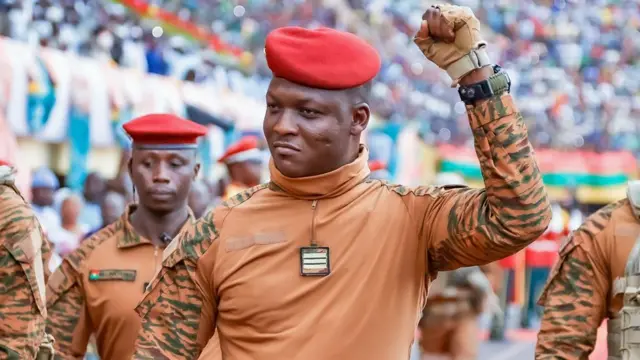Capt Ibrahim Traoré: Burkina Faso’s Rising Leader Captivates Africa and Beyond
At the helm of Burkina Faso’s military government, Captain Ibrahim Traoré, a 37-year-old leader, has emerged as a potent symbol of pan-Africanism. His vision is to liberate his nation from what he perceives as Western imperialist grasp, effectively resonating with a growing number of admirers across the continent and further afield. Supporters liken him to revolutionary figures like Thomas Sankara, the iconic leader of Burkina Faso, often dubbed “Africa’s Che Guevara.”
Beverly Ochieng, a senior researcher at global consultancy firm Control Risks, noted, “Traoré’s impact is enormous. Even politicians in East Africa, such as in Kenya, acknowledge his significance.” This sentiment underscores a broader wave of discontent among Africans questioning their ties to Western nations amid persistent poverty despite the continent’s wealth.
Shift in Alliances and Economic Policies
After seizing power through a coup in 2022, Traoré’s government pivoted sharply away from colonial ties with France, choosing instead to align more closely with Russian interests. This shift comprises a myriad of left-leaning economic reforms aimed at bolstering national ownership of Burkinabé resources. These reforms have included:
- Establishment of a state-owned mining enterprise
- Regulations mandating foreign firms to allocate 15% of their local ventures to the state and facilitate skill transfers to local workers
- Authorization of investments by the Russian miner Nordgold in the country’s gold industry
Traoré’s administration has been proactive in nationalizing several gold mines previously in foreign ownership and is developing a gold refinery, hoping to secure national reserves that have never been established in the country’s history.
Growing Popularity and Social Media Influence
Traoré’s radical reforms have amplified his popularity on the African continent, as noted by Enoch Randy Aikins from the Institute for Security Studies, who proclaimed him as possibly the continent’s most beloved leader. His presence has found its way into social media dynamics – inflated by questionable posts, including music videos featuring prominent figures singing in his honor, which have fanned the flames of his revolutionary persona.
His speech at the 2023 Russia-Africa summit attracted attention when he urged leaders to abandon the role of “puppets” dictated by imperialists. This drastic rhetoric was heavily endorsed by Russian media, aiding in his rising profile.
Challenges of Governance and Ongoing Conflicts
Despite his growing popularity, Traoré’s government has struggled with internal dissent and has yet to resolve a decade-long Islamist insurgency that has incited ethnic strife that is spilling into neighboring countries. Critics of his regime voice concerns over crackdowns on independent media and political opposition, as dissenters, including health professionals and judicial figures, face dire consequences.
Experts like Rinaldo Depagne of the International Crisis Group have attributed Traoré’s appeal largely to his age and media-savvy approach, effectively connecting with a youthful population. As his administration attempts to rebuild the nation’s image, striking contrasts are evident between Traoré’s dynamism and other continental leaders who maintain power through less democratic means.
Economic Outlook amid International Tensions
| Indicator | 2023 | 2024 | 2025 (projected) |
|---|---|---|---|
| Inflation Rate | 0.7% | 4.2% | N/A |
| Extreme Poverty Rate | 26.9% | 24.9% | N/A |
International financial institutions like the IMF and World Bank have acknowledged some economic improvements under Traoré’s rule despite the backdrop of humanitarian challenges. Nonetheless, relations with Western countries remain strained, particularly with France and the United States, as accusations regarding Burkina Faso’s gold reserve utilizations circulate.
The future narrative for Traoré, alongside his counterparts in Mali and Niger, remains uncertain. Yet his influence continues to leave a significant mark on West African affairs, fostering regional tensions that redefine political landscapes.


